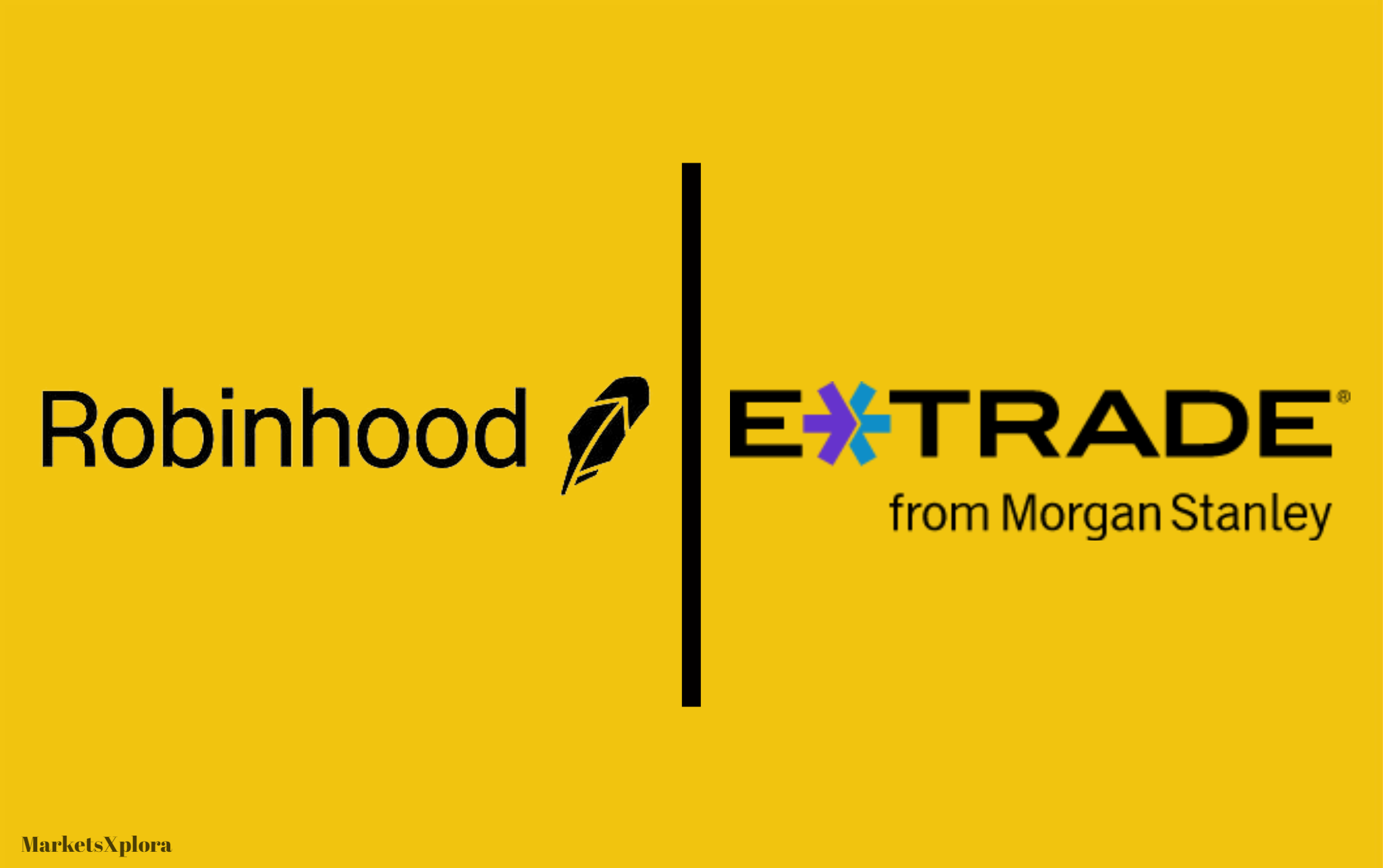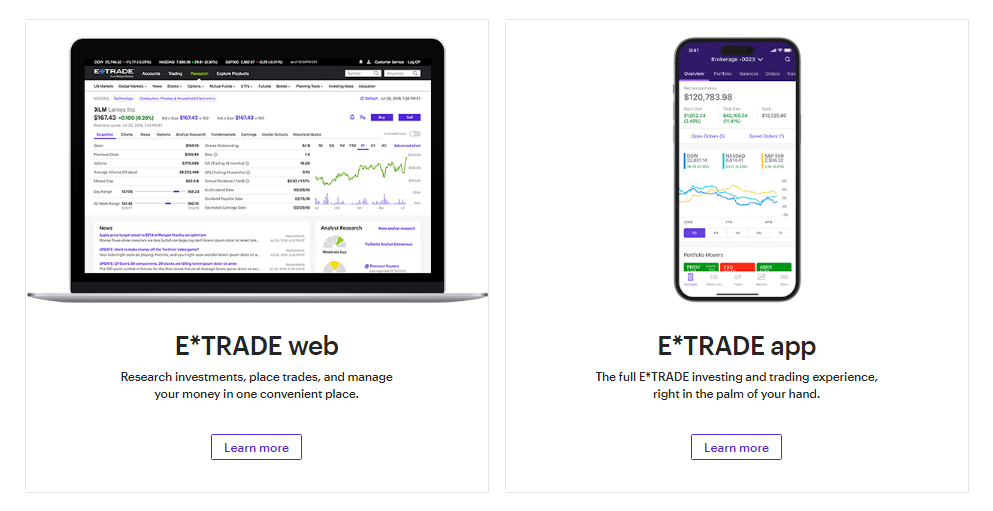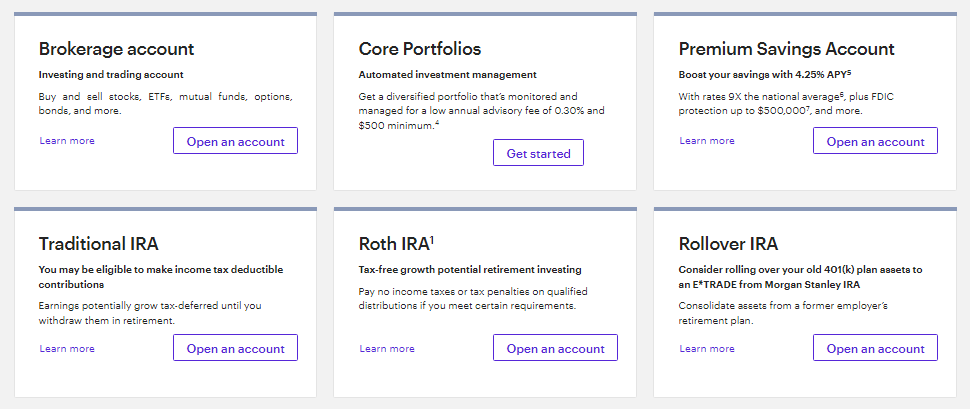
Are you stuck choosing between Robinhood vs E*TRADE? As a beginner, if you pick the wrong investing app, you will battle hidden fees, clunky tools, or worse—lose sleep over security. Robinhood’s simplicity tempts beginners, but does it leave you unprepared? E*TRADE’s power intimidates newbies, yet might it unlock smarter growth? In this ETrade vs Robinhood comparison, we dissect fees, features, and risks so you invest confidently. Your money deserves the right platform—not just the easiest or flashiest.
Let’s begin with a quick overview of both platforms!
Robinhood vs ETrade: Quick Overview
 |
 |
|
|---|---|---|
Year Founded |
2013 |
1982 |
Founders/CEO |
Vlad Tenev, Baiju Bhatt |
Morgan Stanley (founded as subsidiary), Michael Pizzi (CEO) |
Headquarters |
Menlo Park, California |
Arlington, Virginia |
Company Type |
Financial Technology Startup |
Online Brokerage Firm |
Regulated By |
FINRA, SEC |
FINRA, SEC |
Account Minimum |
$0 |
$500 for brokerage accounts |
Key Features |
Commission-free trades, fractional shares, user-friendly app |
Wide range of investment products, advanced trading tools, advisory services |
Robinhood vs Etrade: Key Comparison Criteria
When choosing between Robinhood and E*TRADE, the devil is in the details. Let’s dive into the specifics to see how these two platforms stack up in areas that matter most to investors.
Fees and Commissions
Let’s start with the big one: fees. After all, no one wants to lose money before they even start investing.
- Robinhood is a champion of commission-free trading. Whether you’re buying stocks, ETFs, or options, you won’t pay a dime in trading fees. That’s a huge win for beginners and casual investors who want to keep costs low. However, if you want access to premium features like bigger instant deposits or professional research, you’ll need to subscribe to Robinhood Gold, which starts at $5 a month. It’s not a dealbreaker, but it’s something to keep in mind.
- E*TRADE also offers commission-free trading for stocks, ETFs, and options, so it’s on par with Robinhood in that regard. But here’s where it gets a little tricky: ETRADE charges fees for certain transactions, like buying or selling mutual funds. These fees aren’t huge, but they can add up if you’re a frequent trader. On the flip side, ETRADE doesn’t nickel-and-dime you for access to advanced tools or research—it’s all included.
The Bottom Line: If you’re looking for a truly no-frills, no-fee experience, Robinhood has the edge. But if you’re okay with occasional fees for a more robust platform, E*TRADE is worth considering.
Robinhood |
E*TRADE |
|---|---|
Investment Options
Now, let’s talk about what you can actually invest in. After all, a platform is only as good as the opportunities it gives you.
- Robinhood keeps it simple with a focus on the basics: stocks, ETFs, options, and cryptocurrencies. It also offers fractional shares, which is a game-changer if you’re working with a smaller budget. Want to own a piece of Google or Apple without breaking the bank? Robinhood lets you do that. However, if you’re looking for more variety—like mutual funds or bonds—you’ll be out of luck. Robinhood is great for straightforward investing, but it’s not the place for building a highly diversified portfolio.
- E*TRADE, on the other hand, is like the all-you-can-eat buffet of investing. In addition to stocks, ETFs, and options, you can trade mutual funds, bonds, futures, and even managed portfolios. This makes it a fantastic choice if you’re looking to spread your investments across different asset classes. E*TRADE also offers fractional shares, though it’s not as prominently featured as on Robinhood. The sheer variety of options means you can tailor your portfolio to match your goals, whether you’re saving for retirement or dabbling in active trading.
The Bottom Line: Robinhood is perfect if you’re sticking to the basics, but E*TRADE is the clear winner if you want more options to diversify your investments.
Trading Platforms and Tools
Robinhood is built for speed, simplicity, and your smartphone. Its app is stripped down to the basics: a clean interface where you can buy or sell stocks, ETFs, options, or crypto in a few taps. There’s no clutter—just price charts, a watchlist, and a news feed. But that’s also its weakness. You won’t find advanced tools like technical indicators, customizable screens, or futures trading. It’s perfect for casual investors who want to trade quickly, but seasoned traders will feel boxed in.
E*TRADE, however, rolls out a toolbox for every type of trader:

- Power E*TRADE (Web): The heavyweight champion. Dive into 100+ technical studies (like RSI or MACD), interactive charts with drawing tools, and preset scans to spot trading opportunities. It’s built for serious traders who live for real-time data and precision.
- Power E*TRADE (App): All the muscle of the web platform, condensed into your phone. Trade stocks, ETFs, options, or futures in one place, with the same advanced charts and risk analysis tools.
- E*TRADE App: A simpler, award-winning mobile app for managing accounts, trading, or tracking markets on the go. Sync it with Apple Watch or tablets for updates anywhere.
- E*TRADE Web: The classic platform for everything from saving to retirement planning. It’s less flashy than Power E*TRADE but still packed with research, portfolio tracking, and educational guides.
Robinhood’s “less is more” approach works for beginners, but E*TRADE’s platforms are where strategy gets built.
Robinhood |
E*TRADE |
|---|---|
Research and Education
Robinhood gives you the bare minimum. You’ll see basic price charts, earnings calendars, and headlines from outlets like Reuters or CNBC. Their “Learn” section has short articles explaining terms like “ETF” or “dividend,” but it’s more of a glossary than a classroom. If you’re trying to master options strategies or analyze market trends, you’ll need to look elsewhere.
E*TRADE treats research like a superpower:
- Third-party analyst reports from firms like Morningstar and CFRA.
- Customizable screeners to filter stocks, ETFs, or mutual funds by performance, sector, or risk level.
- Live TV feeds from CNBC and Benzinga for real-time market news.
- Advanced charting tools with over 100 technical indicators.
- Educational Hub: Free courses, video tutorials, and webinars on topics ranging from “How to Read a Balance Sheet” to “Advanced Options Trading.” They even offer retirement planning guides and tax strategies.
Robinhood hands you a flashlight; E*TRADE gives you a spotlight. If you want to understand the market, not just trade in it, E*TRADE’s resources are unmatched.
Robinhood vs Etrade: Account Types

Robinhood keeps it simple, but here’s the full list of what’s on the menu:
- Individual Brokerage Account:
Trade stocks, ETFs, options, and crypto with no minimum balance. Everything’s commission-free. - Robinhood Cash Account:
No margin trading here—trades use only settled funds. Good if you want to avoid debt, but slower fund settlement. - Robinhood Instant (Margin) Account:
The default option. Get instant access to deposits (up to $1,000), margin trading, and extended-hours trading. - Robinhood Gold:
A premium subscription ($5/month) for bigger instant deposits, Level II market data, professional research, and lower margin rates. - Retirement Accounts (IRA):
Choose between a Traditional IRA or Roth IRA. Robinhood even throws in a 1% match on contributions.
E*TRADE, meanwhile, feels like a financial buffet:
- Brokerage Account:
Trade stocks, ETFs, mutual funds, options, bonds—you name it. No surprises here. - Core Portfolios:
A robo-advisor service (0.30% annual fee) that builds and manages a diversified portfolio for you. Minimum $500 to start. - Premium Savings Account:
A juicy 4.00% APY on savings (FDIC-insured up to $500k). Great for parking cash you’re not ready to invest. - Traditional IRA:
Tax-deductible contributions and tax-deferred growth for retirement savings. - Roth IRA:
Pay taxes upfront, then enjoy tax-free withdrawals in retirement (if you qualify). - Rollover IRA:
Move old 401(k)s or employer plans here to consolidate and control your retirement funds.
FAQs: Robinhood vs. E*TRADE
1. Which is better: Robinhood or E*TRADE?
It depends! Robinhood is better for beginners who want simplicity, zero fees, and crypto trading. E*TRADE is better for experienced investors who need advanced tools, research, and retirement planning.
2. Are there hidden fees?
With Robinhood, there are no commissions on stocks, ETFs, or crypto. Fees apply for Robinhood Gold ($5/month) and margin trading. With E*TRADE, there are no commissions on stocks/ETFs, but charges 0.50–1.00 per options contract and $19.95 for mutual funds not in their no-transaction-fee list.
3. Which offers more account types?
E*TRADE wins. It supports IRAs, 401(k) rollovers, trusts, custodial accounts, and managed portfolios. Robinhood only offers taxable brokerage accounts and IRAs.
4. Can I trade cryptocurrencies?
Yes! You can trade Bitcoin, Dogecoin, and 15+ cryptos on Robinhood. On the other hand, E*TRADE does not offer crypto trading—only stocks, ETFs, options, and bonds.
5. Which has better research tools?
E*TRADE dominates with third-party analyst reports, live CNBC streams, and advanced charting. Robinhood has basic charts and news headlines.
6. Which app is easier to use?
- Robinhood: Sleek, intuitive, and perfect for quick trades.
- E*TRADE: More complex but offers Power E*TRADE for serious traders.

